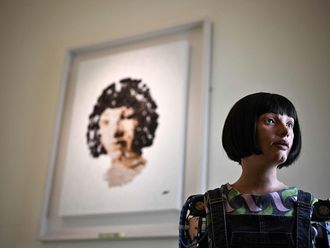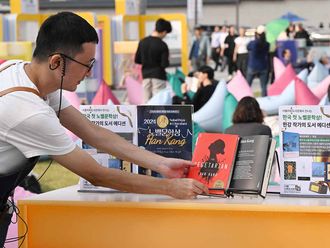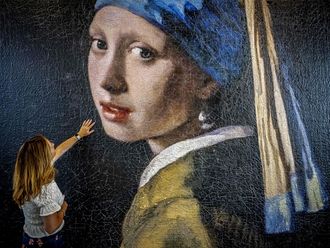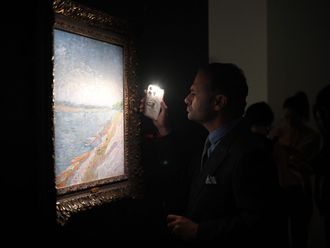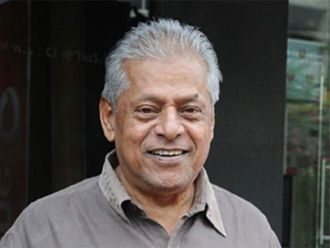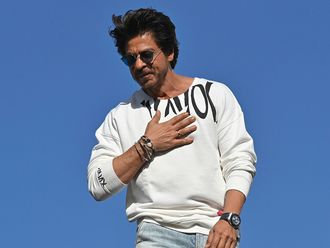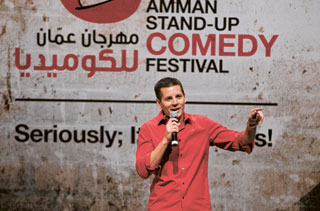
Sitting in the audience of a stand-up comedy show, you’d think being funny is easy. Well, not really. Going up on stage and making people laugh can take days, sometimes months, of writing and rehearsing.
That certainly was the case for the students of the stand-up comedy workshop organised by the Dubomedy Arts school in Dubai, the first comedy school in the region.
Led by Arab American stand-up comedian Dean Obeidallah, almost 20 students took part in the workshop to learn how to write a joke, perform, and the ethics and business of comedy.
“It’s hard work,” Obeidallah, who was in Dubai for the workshop and a public show last week, told tabloid!.
“I can’t teach anyone to be funny,” he said. “What I can teach is the structure of stand up, the idea of a joke, and how you can build on a stand-up comedy foundation that is good.”
He said that stand-up comedy is not about being the funniest person at work, among a group of friends or at school. “Many people who are hilarious off-stage, are not good stand-up comics.” It’s like learning a new language, he said. It’s about learning how to tell jokes to strangers and making them relate to it.
Following the workshop, students were put to the test by performing in front of a real audience. The best two were in for a treat — the opportunity to open for Obeidallah’s show.
It was interesting to see students who had not done comedy before progress and get over their fear in just three days, which is why it was tough to make a choice, he said. “We were really torn,” he said. “We went with experience and having a diverse line-up.”
Mohammad Fahad Kamal, a Qatari stand-up comedian, was one of the winners.
Pioneer
Kamal who’s been doing stand-up comedy for the past two years is the first to do it in his home country. He said he feels like a pioneer with a bull et-proof vest because a lot of people have been criticising him for what he’s doing.
“Comedy is new in the Middle East. We don’t have enough clubs and people interested in comedy and that’s why we need to connect with all the comedians in the region and have a platform where we can travel around and do our gigs,” he said.
Brent Jenkins, an aspiring stand-up comedian from the United States, was the runner-up. He said he took a comedy class about nine months ago and had only been up on stage three times before Obeidallah’s show. “It was kind of accidental,” he said speaking of how he got into it. “After taking a class, I started to write more and the more fun it was. Now, I’m hooked.”
For the past year, Obeidallah has been making it a point to work with local talent in the Middle East and while it’s new to the region, he says it’s really growing. “We need more Arabs doing comedy,” he said. “From Oman all the way to Amman, from Cairo to Riyadh people are doing comedy and I think it’s great. Some are really really funny and some need more work.”
Locally, Ali Al Sayed and Mina Liccione, have been doing just that. The two started Dubomedy Arts three years ago with only 12 students. Today, they have over 200 students from different nationalities.
Stereotypes
“Comedy breaks barriers. The closest distance between two people is laughter and to have a room of all those nationalities laughing at stereotypes and laughing at themselves — this is it,” said Mina Liccione, head teacher and co-director of Dubomedy.
The school is looking at expanding its programmes from January 6-10 next year, said Al Sayed, the CEO of Viva Arts, which runs Dubomedy, also a stand-up comedian. While most classes have been in English, he said they plan on starting some Arabic programmes.
Different voice
The reason is to reach out to the Arabic speaking community and to create comedy with a different voice.
“I believe the format that’s been used has been exhausted and people are stuck in a place where creativity has been very limited and everyone’s been looking from a commercial stand point,” Al Sayed said. We want Arabs to let down their guard and try to make each other laugh, he added.
Fifteen years ago, Obeidallah decided to put his law degree aside and pursue a career in comedy.
He said he’s been inspired by comedian such as Richard Pryor, Jon Stewart and Chris Rock, who talk about political and social issues.
“I love Jon Stewart and The Daily Show,” he said. “I like the guys who are smart and talk about smart stuff.”
Top Tips from the Dean
- 1 Try it. Don’t give yourselves excuses for not doing it. Just do it. Take a class. Go to open mics or small shows.
- 2 Watch comics on YouTube and write a couple of jokes down verbatim to how the joke structure.
- 3 It’s hard work. You have to write, rewrite, perform, rewrite and perform again.
Dean’s Best Joke
When asked to tell us his best joke, Obeidallah said it’s usually his most recent one. This is the one he told.
“Here’s the difference between Arab men and American men when the bill comes after dinner.
There’s a group of white guys and the bill comes, so they divide it up and they’d be like “Okay you got two sodas; here’s your bill.” But when a group of Arab guys put the bill down, it’s like throwing meat into a shark tank.
They’d be like “No, no, no, habibi, I’m going to pay. Habibi, I will pay this.” The other guy says, “If you pay this I will never speak to you again; I swear we are not talking.”
Another guy says, “If you pay this, I will defriend you. I will block you from my Facebook.” One says, “If you pay this, I will divorce my wife. I swear I will divorce my wife.”
It makes me wonder about this expression. Does this ever happen? Does the guy go home and tell his wife: “I’m sorry. You gotta go. My friend paid for lunch. Bye bye now. Nice meeting you’.”


